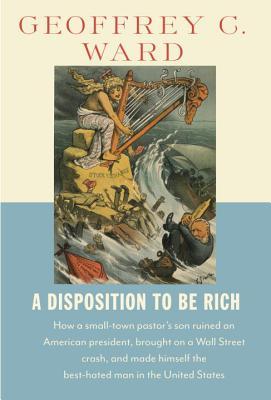
By Geoffrey C.
(Ward; Knopf)
Sure, we’ve all got a skeleton in the family closet. But Geoffrey C. Ward’s is particularly haunting.
On Wall Street in the 1870s and ’80s, Ferdinand Ward pulled off a sprawling pyramid scam that ensnared some of America’s biggest financial names by promising ― and delivering ― unheard-of investment returns.
When his scheme collapsed in 1884, it sparked a Wall Street panic, forced a major bank to close and claimed the fortune and reputation of Ward’s business partner: former President and Civil War hero Ulysses S. Grant. When a brokenhearted Grant died soon after, his death was blamed on the calamity ― and on Ward.
Family memoirs are nothing new, but Ward’s “A Disposition to Be Rich” ― Ferdinand is his great-grandfather ― has the advantage of being written by an award-winning historian. Best known for his longtime partnership with documentary filmmakers Ken and Ric Burns, Ward has a solid perspective on American history, particularly the nation’s growing pains of the second half of the 19th century.
“A Disposition to Be Rich,” though, is not dispassionate storytelling. Geoffrey Ward’s scorn for his great-grandfather rings loud and clear throughout, sometimes jarringly so.
Still, that’s understandable when you get into the story ― a story that involves greed, duplicity and even kidnapping.
The youngest son of inflexible Protestant missionaries, Ferdinand Ward early on developed a taste for good living and a certainty that he deserved every bit of it.
He landed a position as a clerk at Wall Street’s Produce Exchange, a clamorous place where brokers met to buy and sell carloads of flour, cheese and other foodstuffs. Skilled at working the room, he began dazzling the Street with astonishing returns ― returns that won him the confidence of, and then a partnership with, former President Grant.
Soon the money was flooding in, and Ward, in his early 30s, was being touted in the business press as the “Young Napoleon of Finance.”
There was just one problem: Ward wasn’t making money, he was just recycling it, taking new investors’ cash to pay returns to older ones, and sometimes borrowing to make the difference. As with all pyramid schemes (think Bernie Madoff), it worked fine until the cash stopped flowing in.
Which it did in the spring of 1884. Over the course of one weekend, Ward and Grant’s firm went under, a confederate’s bank was shut down and the ripples swamped investors and institutions along Wall Street. (MCT)
-
Articles by Korea Herald











![[Hello India] Hyundai Motor vows to boost 'clean mobility' in India](http://res.heraldm.com/phpwas/restmb_idxmake.php?idx=644&simg=/content/image/2024/04/25/20240425050672_0.jpg&u=)








